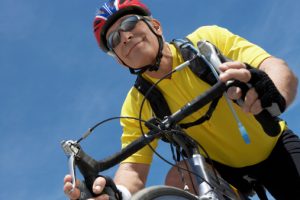 Nocturia (excessive nighttime urination) risk is lower in physically active men. Males may experience nocturia due to an enlarged prostate, overproduction of urine, low bladder capacity, and sleep disturbances.
Nocturia (excessive nighttime urination) risk is lower in physically active men. Males may experience nocturia due to an enlarged prostate, overproduction of urine, low bladder capacity, and sleep disturbances.
The researchers analyzed data from 28,404 men with pre-existing benign prostatic hyperplasia (BPH) and 4,710 men with newly developed BPH (incident group). In the incident group, men who were more physically active – one or more hours a week – were 13 percent less likely to report nocturia, compared to men who did not report any physical activity.
Advertisement
Possible mechanisms behind the link between physical activity and nocturia include smaller body size, improved sleep quality, a decrease in the sympathetic nervous system activity, and lower levels of systemic inflammation.
Natural home remedies for nocturia
Treatment for nocturia involves addressing the cause. This could involve antibiotics for a present UTI, prescription medications for diabetes and more effective diabetes management strategies, sleep apnea treatment, and lifestyle modification such as moderating beverage consumption.
Sometimes, your doctor may prescribe medications that are commonly used for overactive bladder treatment to ease the symptoms.
Nocturnal urination can be a nuisance and can have negative effects on your health. If you’re tired of getting up to pee every night, here are some natural remedies you can try to ease nocturia.
- Drink grapefruit juice regularly as it is a powerful antioxidant.
- Take rice vinegar, which is a powerful antiseptic, to help clean your system of bacteria that may be causing nocturia.
- Consume brown rice before bed – rice is known to absorb fluids.
- Lose weight – sometimes, excess weight pushing on your bladder increases the urge to urinate.
- Drink cranberry juice and grapefruit juice.
- Reduce your intake of fluids prior to bed.
- Avoid caffeine or alcohol.
- Don’t smoke – smoking damages the bladder.
- Keep your legs elevated to prevent pooling fluid.
- Wear compression stockings.
- Schedule your diuretic medication properly, not too close to bedtime.
- Take the necessary precautions to prevent UTIs.
By trying some of these natural remedies, you can have greater success in managing your nocturia. Speaking with your doctor regarding frequent nighttime urination is still imperative as, once again, it is often a sign of another condition that may require medical intervention. By knowing the exact cause of your nocturia, you can effectively treat the condition and alleviate your nighttime urination.
